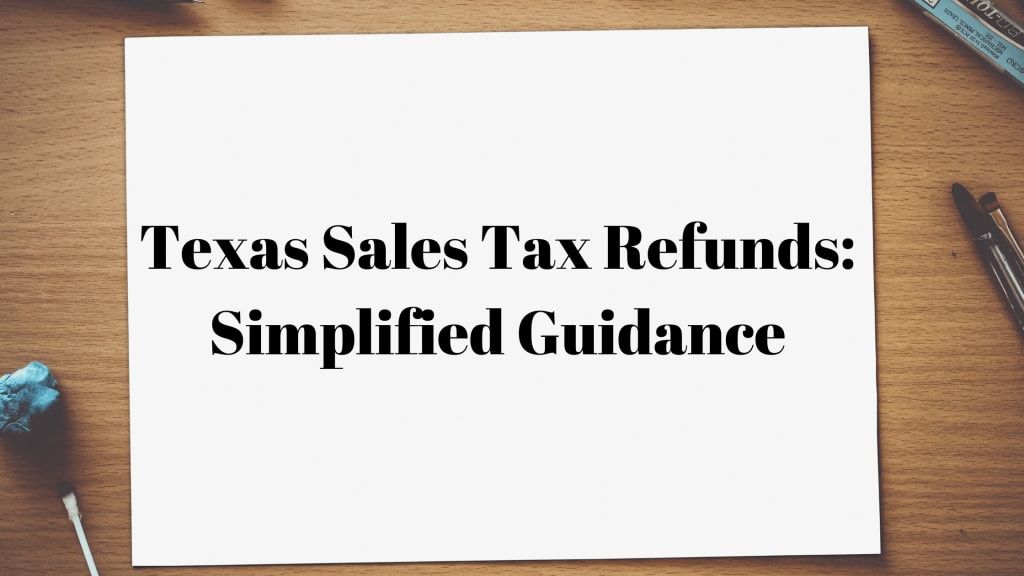TEXAS SALES TAX REFUNDS: SIMPLIFIED GUIDANCE
TEXAS SALES TAX REFUNDS

In the vast expanse of Texas tax laws, understanding when and how to claim refunds is crucial. Whether you’re a seller or a buyer, certain circumstances allow for a refund. From overpaid taxes to exempt transactions, each scenario demands a nuanced approach.
Prior to seeking a refund, ascertain the category that pertains to you from the following options:
- I am the vendor of the taxable item and possess a Texas sale and use tax permit (Permitted seller).
- I am the buyer of the taxable item and hold a Texas sale and use tax permit (Permitted buyer).
If you do not possess a Texas sale and use tax permit and you are the buyer, it is necessary for you to request a refunds from the seller for any erroneously paid taxes initially. The seller has the option to either provide the refund directly or furnish you with Form 00-985, Assignment of Right to Refund, enabling you to directly file a refund claim with the Comptroller.
Requirements for Claiming a Refund
In Texas, the requirements for filing a sales tax refunds claim typically include:
- Please complete a written claim form, providing thorough and detailed explanations for each reason or basis upon which the claim is being made. You can download Form 00-957-Texas Claim for Refund for this purpose.
- Specify the timeframe in which the overpayment being claimed occurred, and Please ensure that the claim is submitted within the relevant time frame, typically within four years from the date when the tax became due and payable.
- If a refund claim is filed by someone other than the individual or entity entitled to the refund (such as an accountant or attorney), please complete and submit Form 01-137, Limited Power of Attorney.
- If the individual requesting a tax refund is not the same person or entity who originally paid the tax to the Comptroller’s office, please fill out Form 00-985, Assignment of Right to Refund. A separate form is necessary for each vendor to whom the tax was incorrectly paid, and each form must be signed by authorized personnel.
Statute of Limitations
Typically, individuals or businesses are allowed a period of four years from the date when the tax became due and payable to file a refund claim. Nevertheless, the statute of limitations, which defines the timeframe within which a person can request a refund, might be extended if:
- During an audit of your financial records, you might sign a document called a “Period of Limitation Extension Agreement.” This extends the time you have to ask for a refund.
- If your financial records undergo a thorough review or examination, it could result in an extension of the deadline for submitting a refund request. You can find more details about this process in our publication titled “Contesting Disagreed Audits, Examinations, and Refund Denials” under the section titled “Your Options After Receiving a Texas Notification of Audit Results or Texas Notification of Exam Results.”
The statute of limitations continues to progress unless there’s an event that pauses it. When all refund claim conditions are fulfilled, the statute of limitations is “tolled,” meaning the countdown temporarily stops.
Filing a Refund Request
To request a refund, you have various choices available to initiate:
- Utilize the Texas Claim for Refund web form, where you can upload supporting documentation in PDF or ZIP format (limited to 2MB).
- Download the fillable PDF form 00-957 and submit it along with supporting documentation via email to [email protected], or print and mail it to:
Texas Comptroller of Public Accounts
Attn: Sales and Motor Vehicle Tax Refunds
111 E. 17th Street
Austin, TX 78774-0100
- For inquiries about the status of a previously submitted claim, you can email [email protected].
Review of Refund Claim and Supporting Documents
The Comptroller’s office verifies refund claims using supporting documentation and may request additional information for each transaction. Such items may encompass, though not exclusively, the following:
Information required for refund claims may include:
- Name of the purchaser or seller
- Copy of the invoice, if applicable
- Date of the transaction
- Purchase or sale amount
- Sales journal
- General ledger
- Resale, exemption, and/or direct pay certificates
- Total amount of tax refund requested
- Proof of payment
- Executed contracts
- Utility predominant use studies, if applicable
- If requesting refunds for taxes paid in error to a permitted seller, the seller’s name, address, and sales tax permit number or information allowing the Comptroller’s office to identify the seller’s sales tax permit number.
- If the Comptroller’s office requests your invoices and you have over ten, present them in a schedule format.
Results of Refund Claims
Refund claims can result in one of three outcomes: approved, incomplete, or denied/partially denied.
1. Approved Claims
Once the Comptroller’s office approves a refund claim, a refund check will be sent to the individual or entity entitled to it. Factors such as timely filing discounts, penalties, credit interest, or existing liabilities can impact the refund amount.
Refund checks are typically mailed unless the claimant is enrolled to receive refunds via direct deposit. If you’re not already set up for direct deposit, please contact the Revenue Accounting Division at 512-463-4561 to request Form 74-221, Tax Refunds Direct Deposit Authorization, to begin receiving payments electronically.
2. Incomplete Claims
The statute of limitations will continue running until all the necessary elements are included in a refund claim. The Comptroller’s office will inform the claimant of any additional information required.
3. Denied or Partially Denied Claims
If the Comptroller’s office cannot grant the refund fully or partially, the claimant will be notified, and the reasons for the denial will be provided. The claimant has the option to challenge the denial by either filing a refund hearing request or a notice of intent to bypass hearing within 60 days of the denial.
Upon timely request for a refund hearing, the Comptroller’s office may request all evidence supporting the claim for refund. This evidence must be submitted within 60 days of the date of the demand notice or within 180 days after the refund claim date, whichever is later. Failure to timely submit requested documents as per the demand notice will result in the exclusion of such evidence in the refund hearing.
If the Comptroller receives a notice of intent to bypass the hearing within the specified time frame, a conference may be conducted to discuss the availability of additional supporting documentation to resolve any issues before proceeding to district court. If some issues are resolved during the conference, the person who filed the notice may amend or remove these issues. However, if some issues remain unresolved, the individual may then initiate a lawsuit in district court within 60 days after the conference concludes.
Conclusion
navigating the refund claim process in the state of Texas requires attention to detail and adherence to deadlines.
Whether your claim is approved, incomplete, or partially denied, understanding your options is crucial. Remember to provide all necessary documentation promptly and consider seeking further assistance if needed.
By staying informed and proactive, you can work towards achieving a favorable outcome for your refund claim.
Disclaimer:
The information provided in this content is for general informational purposes only. You should always seek the advice of an expert before making any decisions based on the information provided. We do not warrant or guarantee the accuracy, completeness, or usefulness of the information provided. Any reliance you place on such information is strictly at your own risk. We are not responsible for any damages, losses, or expenses related to the use of this content.
About the Creator
Enjoyed the story? Support the Creator.
Subscribe for free to receive all their stories in your feed. You could also pledge your support or give them a one-off tip, letting them know you appreciate their work.





Comments
There are no comments for this story
Be the first to respond and start the conversation.